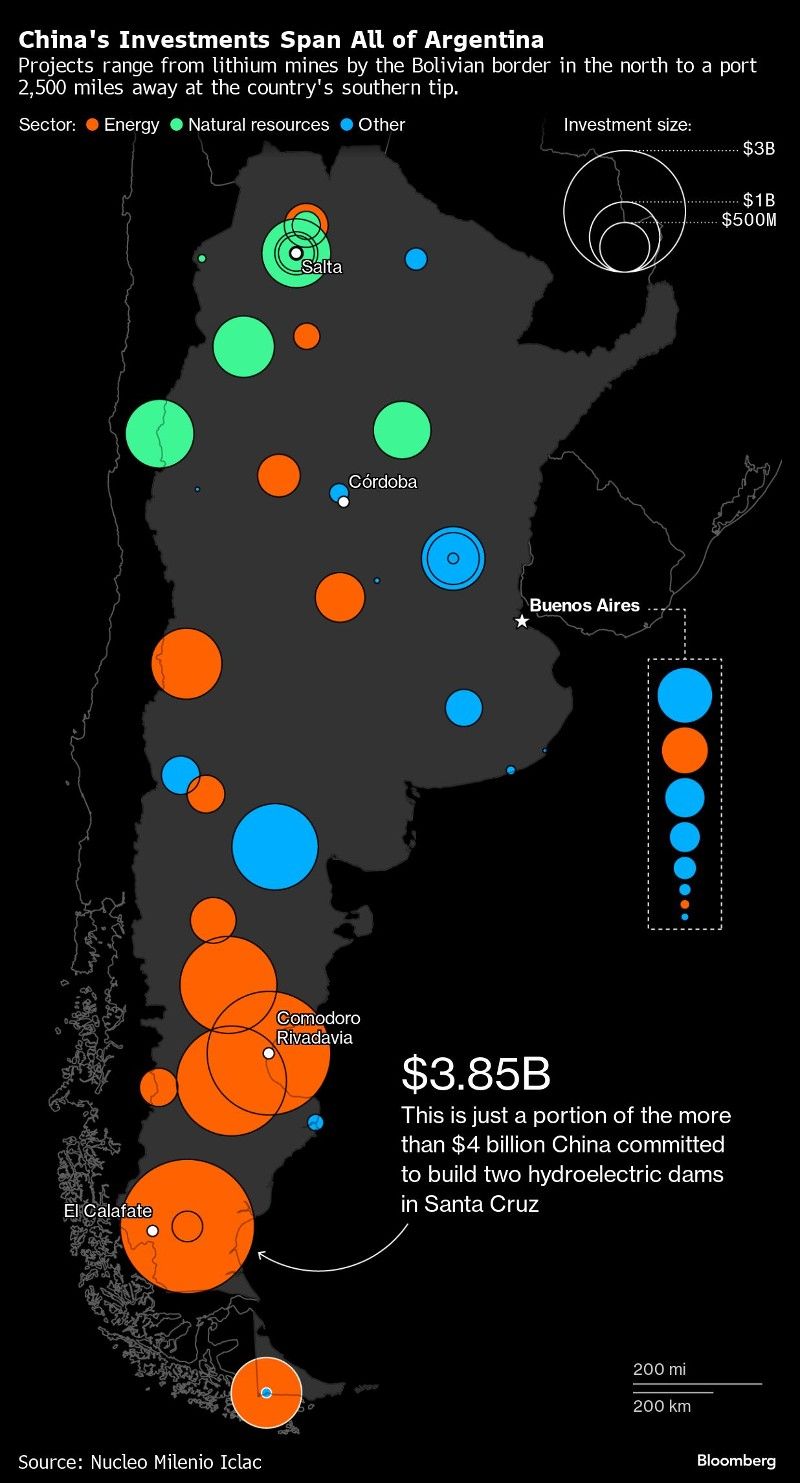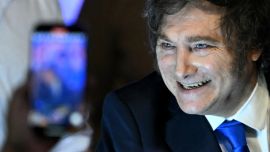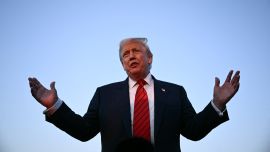Developing nations around the world are grappling with a choice of allegiance to the United States or China on matters of trade, financing and security. Nowhere is that tougher than in Argentina.
The South American country’s 276 percent inflation, history of sovereign bond defaults and six recessions over the last decade have made it more financially dependent on Beijing than any of its neighbors in Latin America, where the US has lost ground to China.
Eight months ago, Javier Milei vowed he would curb ties with China if he became Argentina’s leader. “Would you trade with an assassin?” he asked. It was a fitting comment for an outspoken admirer of the US, Milton Friedman and Donald Trump, a self-described anarcho-capitalist who rejects socialism and state intervention.
Now, President Milei is taking a far more pragmatic tone, saying trade relations between China and Argentina haven’t changed “one bit,” and that he had no intentions of touching an $18 billion currency swap.
“We have always said that we are libertarians,” he said in an exclusive interview with Bloomberg Editor-in-Chief John Micklethwait. “If people want to do business with China, they can.”
Chinese trade and investment now drive large swathes of Argentina’s economy, ranging from commodities and energy to banking. That remains true even after China's recent market rout led the country to rein in some of its foreign investment.
The logos of ICBC — Industrial and Commercial Bank of China — and Bank of China hang from Buenos Aires skyscrapers. Dozens of infrastructure projects across the country — from hydroelectric dams and oil drilling sites, to a space station and a massive gold mine — have been funded by the superpower.
Not to mention an US$18-billion currency swap line, the largest source of foreign reserves in its depleted Central Bank coffers. It’s become the biggest yuan swap line in the world, at a time when China has been using them in several countries to expand its global influence. In return, China is securing supplies of food, critical minerals like lithium and a new market for its heavy industries.
But the reality is that if Milei wants to take a wrecking ball to Argentina’s highly regulated economy, part of his plan to pull the nation out of poverty and damp inflation, he’ll be hard-pressed to do it without China.
It’s a lesson many other leaders have learned. Before his rise to power, Brazil’s Jair Bolsonaro criticized China and even visited Taiwan — only to later welcome executives from Huawei Technologies Co in the presidential palace and allow the company to participate in Brazil’s 5G network. Back in Argentina, Mauricio Macri, who governed from 2015 to 2019, also sought to cool ties with China, but the plan failed. Honduras, in exchange for economic and development support, broke relations with Taiwan in favour of China last year.
Now, with countries home to 40 percent of the world’s population holding national elections this year, candidates everywhere will be watching how Milei’s foreign policy plays out.
Sprawling reach
For everyday Argentines, their understanding of China’s influence perhaps only goes as deep as “Made in China” labels on goods that account for more than a fifth of all imports. There’s also grocery stores run by Chinese immigrants who arrived in recent decades seeking opportunities in Buenos Aires and beyond.
But the towering monolith at a far end of Buenos Aires’ glistening financial district is testament to the shifting geopolitics of Latin America.
Giant ICBC signs on the top of the 30-story building can be seen miles away. Behind the panes of glass that look out to the brown River Plate estuary, Chinese executives stroll through corridors lit with red lanterns during Lunar New Year. Just 20 years ago, Bank of America’s BankBoston occupied the same offices, and had helped finance Argentina’s agricultural exports boom of the early 20th century. These days, however, US companies struggle to compete against China in Argentina’s strategic sectors.
Even as some US companies exited Argentina in recent years — turned off by the country’s political and economic volatility — ICBC has stayed put through three different governments, racking up a million retail accounts across the country and hiring a well-known Argentine TV host to lead its advertising campaigns.
China even has projects in the most remote expanses of the country — from lithium mines by the arid Bolivian border in the north to plans to build a port 2,500 miles away at the country’s southern tip, just a short ship ride to Antarctica.
Milei said that the Argentine government was beginning negotiations with China to inspect its Patagonia space station, which the United States has said could pose a threat to itself and its allies. This week, US Army General Laura Richardson, who leads the nation's Southern Command, met with Milei's top defence officials with the space station on the agenda, according to La Nación.
“We are going to study the situation,” Milei said. “That also isn’t a problem.”
China’s vast network in Argentina has been built this century — while the US fought wars in Afghanistan and Iraq, China muscled into South America. Investments started mainly during the so-called “pink tide,” when leftist parties rose to power in Argentina, Bolivia, Brazil, Ecuador, and Venezuela. China has since bought up so much copper and soy, and built so much infrastructure, that it’s leapfrogged the US as South America’s largest trade partner.
China is now the second-biggest buyer of Argentina’s exports, behind only its neighbour Brazil, and its main source of imports, according to data compiled by Bloomberg Economics. China is Argentina’s top client for unprocessed soybeans to feed its huge pig herds and for beef. It’s also a top player in Argentina’s lithium rush — which hasn’t gone unnoticed in the United States — investing in projects to produce the battery metal to power its electric bus fleet.

Meanwhile, China has been recalibrating its investments in the region amid a markets rout at home. China’s direct investments in Latin America and the Caribbean in 2022 were US$6.4 billion, far below the annual average of about US$14 billion between 2010 and 2019, according to a recent report.
In 2022, Argentina formally joined China’s Belt and Road, President Xi Jinping’s signature initiative to challenge the US-led world order through a global web of infrastructure build-outs, which would add several billion dollars more of investments.
It was a leftist government — one demonised by libertarian Milei — that signed up to the initiative, and Sino-Argentine relations blossomed during that administration’s four-year term which ended in December. Beyond the lithium investments, China also supplied Argentina with Covid-19 vaccines; it supported efforts to develop Argentine lithium-battery manufacturing; and it accepted the country into the so-called BRICS trading bloc.
China even seemed to back that government for a second term by handing it a financial lifeline at a time when Argentina’s crisis-prone economy was taking yet another turn for the worse.
Given Argentina’s historical links with the West, two Venezuelan immigrants on the streets of the capital said they were wary of China’s incursion in recent years, particularly when it comes to harvesting natural resources.
“All they care about is getting what they want,” said Ana María Rodríguez, 68, a dairy engineer. “We’ve seen that in Venezuela’s oil industry and now they’re taking away Argentina’s lithium.”
Her friend, Judith Albujas, 63, a laboratory assistant, agreed. “We prefer the US approach to things, encouraging people to progress rather than depend on the government,” she said.
Early blunder
Her comments echo remarks made by Milei. At the World Economic Forum in Davos in January, Milei lashed out at socialism and state-heavy economies, like China’s, and the danger that he said they pose to the West.
“We invite the Western world to get back on the path to prosperity,” he said in Switzerland. “Do not surrender to the encroachment of the state.”
Nevertheless, the economic risks associated with China shrinking its enormous presence in Argentina mean Milei can’t rock the boat too violently. A frantic chain of events recently over Taiwan made that clear.
It all began the afternoon of January 8, when local news outlets reported on speculation that Milei’s foreign minister, Diana Mondino, had met with Taiwanese officials.
Within hours, Argentina had denied the meeting ever happened. Two days later, a top China spokesperson said Argentina had “reiterated” its commitment to the so-called One China policy. And finally, on January 12, Mondino posted a photo of herself on X with China’s ambassador to Buenos Aires. She captioned it with a handshake emoji.
“China will always let you know in some way that either you keep the status quo or you pay an enormous economic cost — because when it comes to foreign-policy retaliation China will coordinate action to impact trade, investment and credit,” said Francisco Urdinez, the Argentine director of Nucleo Milenio Iclac, a Chile-based think tank that studies Sino-Latin American relations. “Milei’s government has understood that quickly.”
Diplomats may have also advised that going against Beijing on Taiwan risks undermining Argentina’s claim to the Falklands Islands, locally known as the Malvinas. That’s because in the dispute for control over the archipelago in the South Atlantic, Buenos Aires has a comparable position: while the islands are officially a self-governing British territory, they lie just a few hundred miles from Argentina, which fiercely asserts its sovereignty.
To be sure, Milei is taking other foreign-policy steps to curry favour with his ideological ally the US. He reversed plans to join the BRICS trading bloc, and purchased US-made planes for the air force, rather than Chinese or Indian ones. And he’s cozied up to US allies such as Ukraine and Israel. Milei also seems to be taking a harder stance against Chinese fishing fleets that trespass in Argentine seas to catch squid.
Milei has tried to lure investments from other nations in his first few months as president, including Italy and Japan. In particular, he’s attempted to rebuild trust with US investors — and he’s cozied up to Trump, who’s running for president again in this year’s election.
‘Journey toward pragmatism’
Beyond commercial ties, China’s support — and swap line — is critical to Milei’s policy platform of exiting capital controls, stabilising the economy and even ditching the peso.
Milei said he wouldn’t modify the currency swap “because I think they are commercial agreements between private parties. We have one part in our Central Bank,” he said of the swap. “They have their counterpart in their Central Bank. Therefore, that's not a problem.”
Still, it’s not a perfect solution.
“Even with China’s currency swap, a peso plunge and hyperinflation are risks,” said Adriana Dupita, an analyst at Bloomberg Economics. “Without it, they’re close to a certainty.”
In addition to the swap line, Argentina has by far been the largest regional recipient of commercial loans from China since 2007, with most of them channelled through ICBC, according to the Inter-American Dialogue.
The country has also considered exiting the capital controls with fresh help from the International Monetary Fund, for which it would need all the political support it can get. China, which has the third-biggest voting share in the fund, could spell the difference.
Nicholas Watson, head of Latin America for consultancy firm Teneo, said it seems that “Milei’s government may be a journey toward pragmatism.”
related news
by Jonathan Gilbert & Manuela Tobias, Bloomberg


























Comments